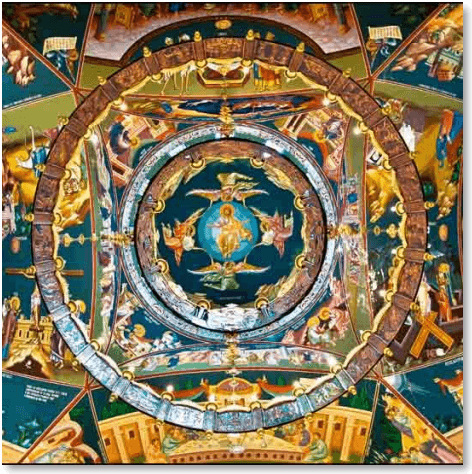“Our Father who art in heaven”
We note at the outset the corporate nature of the prayer: the Lord taught us to say “our Father”, not “my Father” so that even when we say this prayer on our own with no one else around, we still pray as part of a family. The Lord did not act as a one-on-one mentor to individuals, but as a Master to a group of disciples, and his commands to us presuppose that each person is part of a larger group. He was not offering a course in spirituality to individuals who might be interested, but forming a qahal, a gathering, an ekklesia, a church. As such, when He was asked by this group for instruction on prayer (Luke 11:1), he offered a model prayer which presupposed prayer in a group.
We note that Christ taught us to address the deity not as God, Lord, or King (all perfect, good, and Biblical titles), but as “Father”—almost certainly abba in the original Aramaic. Abba means not just “father”, but more specifically “papa”. Along with imma (mother) it was one of the first words a Jewish child learned (compare Isa 8:4). It is a word of sweet intimacy and loving familiarity. The title “father” denotes respect and can be uttered while kneeling or standing at attention; abba presupposes a loving embrace. Yet despite the immense transcendence of God whose glory fills heaven and earth, and before whose face the exalted cherubim and seraphim veil themselves in awe, we are still taught to invoke this transcendent God as our “papa”.
This is because Christ shares with us his intimate relationship with the Father. He is the Son of God by nature, and so of course calls God “abba” (compare Mark 14:36). He shares this sonship with us, so that all that He is by nature, we can become by grace. Thus, after his resurrection He commands Mary Magdalene to tell his disciples that He is ascending “to My Father and your Father; to My God and your God” (John 20:17).

Also, we note that God is described as being “in heaven”—or, literally, “in the heavens” (plural). We tend to think of heaven in the singular, with earth down here and heaven up there. The ancients thought of heaven in the plural. St. Paul referred to the paradisal dwelling of Christ as “the third heaven” (2 Cor 12:2f). Others spoke of seven heavens. The author of the Epistle to the Hebrews spoke of Christ having “passed through the heavens” (Heb 4:14). One should not ask, “So, are there three heavens or seven?” for we are not speaking the language of arithmetic, but of metaphor. This is theology, not astronomy. The point of the theological metaphor is the transcendence of God. God is not just “up there.” He is greater than that. And He is not just “up above up there.” He is higher still. There are many heavens, and God is above them all. In fact, He is so exalted that He has to humble Himself to see what goes on in heaven as well as on earth (Psalm 113:6). He surpasses and defies all description. He is not just “our Father”, but “our Father in the heavens”.
This means that the God who loves us is a God of power and might. He is the Lord Sabaoth, the Lord of the heavenly armies, and that power and might are there to help and save us. There are many that oppose us, many enemies that seek to do us harm and drag us down to death, dust, and despair. We need fear none of them, for the God who is our abba is in the heavens. The Psalmist told us of this long ago: our God is in the heavens; He does whatever He pleases (Psalm 115:3). And what He pleases is to embrace us as his children, since we have taken refuge in his Christ.